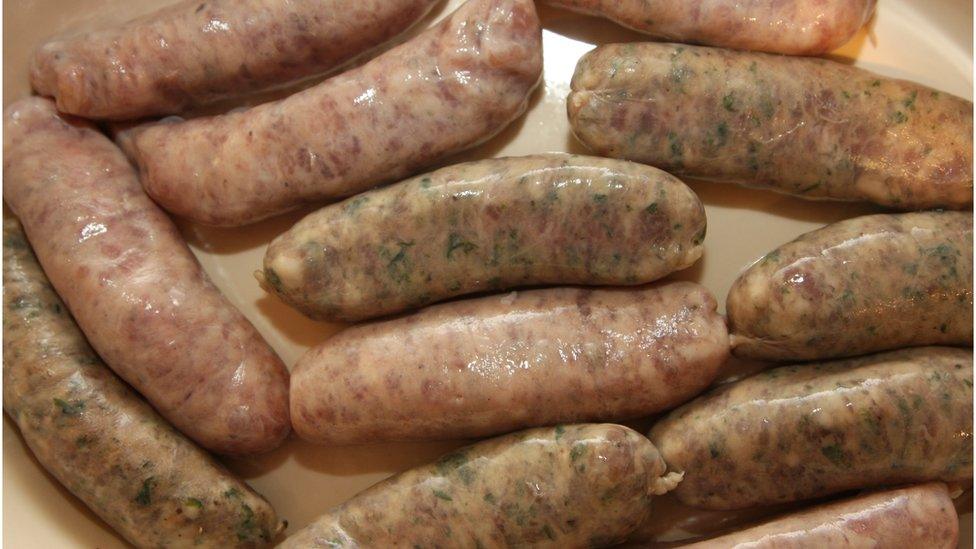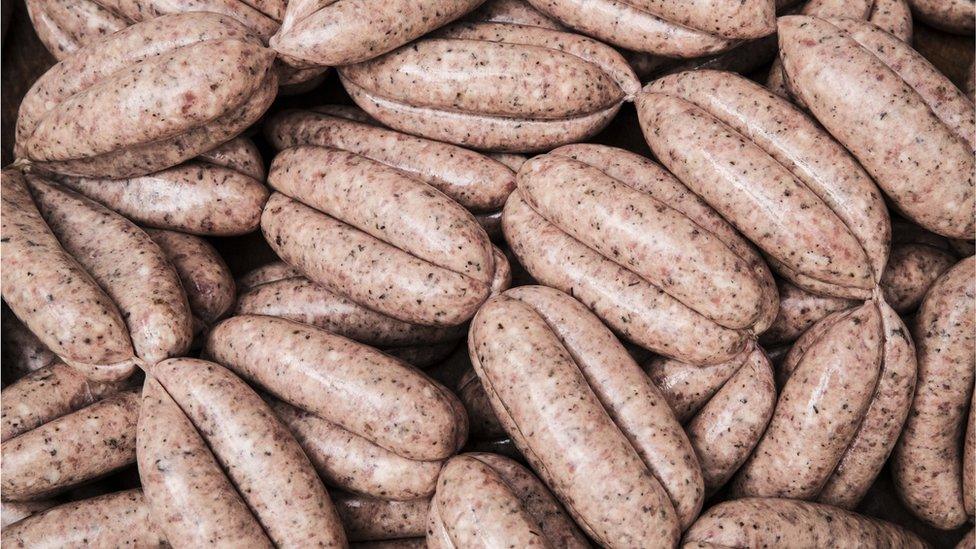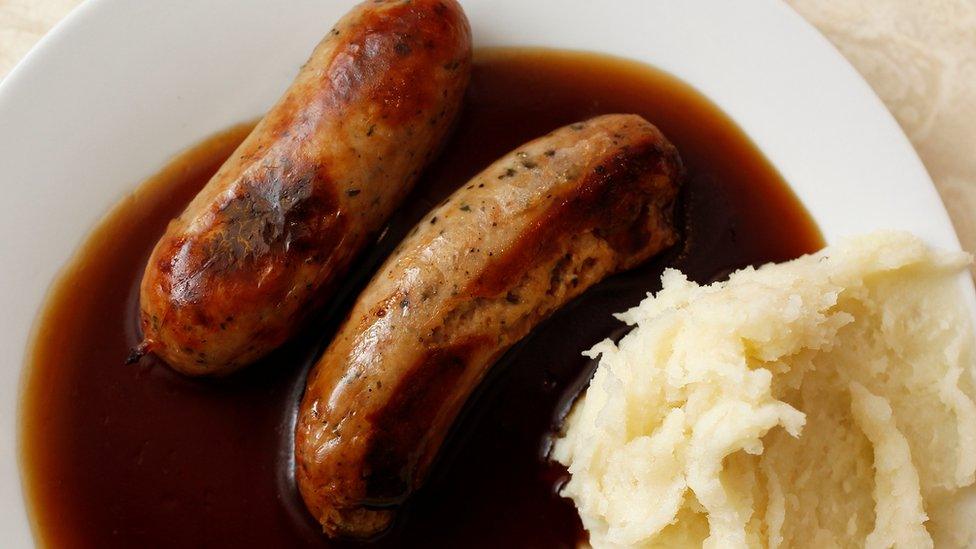Brexit: EU postpones ban on British meat sales in NI
- Published
- comments

The EU has strict rules about the importation of chilled meat products like mince and sausages
The European Union (EU) has agreed to a three-month delay to a ban on some meat products from Great Britain being sold in Northern Ireland.
The proposed ban on items like fresh sausages was a consequence of the Northern Ireland Protocol, a Brexit deal between the UK and EU in 2019.
The EU and UK agreed to extend a so-called grace period - the time before the ban comes into effect.
The new arrangement means the meat ban will be postponed until 30 September.
The EU's chief Brexit negotiator, European Commission Vice-President Maroš Šefčovič said the EU was "accommodating" the UK's request to extend the grace period but was "not issuing a blank cheque".
"This solution is of a temporary nature, in which strong conditions are attached," he added.
"This extension will allow stakeholders, and especially supermarkets in Northern Ireland, to continue to adapt their supply chains to the post-Brexit situation - something yet to be completed.
"What is equally important, we hope that during these three months, the UK will engage constructively on the broader agreement in the areas of public, animal, and plant health based on alignment with EU rules."
Guide dogs and medicines
Mr Šefčovič added that the EU Commission had put forward "solutions in a number of other areas" including the continued supply of medicines and for guide dogs, as well as a decision waiving the need for Northern Ireland motorists to show an insurance green card when driving in EU countries.
He said: "These solutions help to ensure that the application of the protocol impacts as little as possible on the everyday life of communities in Northern Ireland.
"They highlight the EU's commitment to - and ability to deliver - solutions that work."
The EU said it had "identified a solution to facilitate the movements of guide dogs" accompanying those travelling from Great Britain to Northern Ireland, but details had to be worked out.
Current rules mean assistance dogs are not exempt from paperwork and vaccines needed to bring pets from Great Britain to Northern Ireland.
'First step'
The broad agreement was welcomed by the UK's Brexit Minister, Lord Frost, who described it as a "sensible extension".
"This is a positive first step but we still need to agree a permanent solution - Northern Ireland is an integral part of the United Kingdom and its consumers should be able to enjoy products they have bought from Great Britain for years," he said.
Allow X content?
This article contains content provided by X. We ask for your permission before anything is loaded, as they may be using cookies and other technologies. You may want to read X’s cookie policy, external and privacy policy, external before accepting. To view this content choose ‘accept and continue’.

The deal was announced on the same day that a High Court judge in Belfast ruled that the Northern Ireland Protocol was lawful.
The protocol is the part of the Brexit deal that creates a trade border in the Irish Sea in order to prevent a hardening of the Irish land border.
It keeps Northern Ireland in the EU single market for goods and means EU customs rules are enforced at its ports.
It was agreed by the UK and EU in October 2019 and was subject to further negotiation and agreement in 2020.
Sausages, riots and the Northern Ireland Protocol
Lord Frost helped to negotiate the NI Protocol on behalf of the UK government but previously said it was not being implemented as he intended.
'Problems'
In a statement after Wednesday's deal, he said: "This is a very clear sign that the protocol has to be operated in a pragmatic and proportionate way.
"The chilled meats issue is only one of a very large number of problems with the way the protocol is currently operating, and solutions need to be found with the EU to ensure it delivers on its original aims: to protect the Belfast (Good Friday) Agreement, safeguard Northern Ireland's place in the United Kingdom, and protect the EU's single market for goods."
The Labour Party's shadow minister for task force Europe, Baroness Chapman, welcomed the decision but urged Boris Johnson "not to waste" the extension.
Irish Minister for Foreign Affairs Simon Coveney said the extension showed that the EU was delivering solutions to a range of issues raised by the protocol.
"I welcome that the EU has responded positively to the UK's request for an extension to the grace period on chilled meats," he said.
"This co-operative approach recognises that the protocol is jointly owned and must be jointly implemented. The only sustainable solutions are those agreed together.
"Today's announcement also ensures continued access to vital medicines in Northern Ireland as well as addressing issues relating to motor insurance green cards, guide dogs and the movement of certain animals."
Earlier, Taoiseach (Irish Prime Minister) Micheál Martin said that EU-UK work on resolving differences over the Northern Ireland Protocol was of a "stop-start nature".
Speaking in the Dáil (Irish Parliament) he said there was goodwill on the issue on the part of EU leaders but that the UK needed to engage.
The EU does not generally permit the import of chilled meat products like mince and sausages from non-member states.
Since January, producers in Great Britain have not been able to sell these products in the EU single market.
However, in December 2020, the EU agreed to a six-month grace period to allow supermarkets in Northern Ireland to re-orientate supply chains away from Great Britain.
It is this grace period relating to chilled meats which has now been extended.

47% of people in NI say the protocol is not appropriate for NI, while 47% say it is, a new poll suggests
Meanwhile new poll from Queen's University Belfast suggests people in Northern Ireland are evenly split on the protocol.
Almost 70% of respondents agreed that Northern Ireland needs 'particular arrangements' for managing the impact of Brexit but they are divided on the protocol itself.
When asked whether the protocol is appropriate for Northern Ireland, 47% agree that it is but 47% disagree.
Similarly, 43% think that the protocol is, on balance, good for Northern Ireland, whereas 48% think that it isn't.
Nevertheless, 56% agree that the protocol provides Northern Ireland with a unique set of post-Brexit economic opportunities.
People 'highly exercised' over protocol
Professor Katy Hayward, from Queen's University Belfast and a senior fellow of the UK in a Changing Europe, said: "People in NI are highly exercised by the Protocol, both for and against - and in equal proportions.
'The political tensions are compounded by the low levels of trust in the political parties when it comes to the protocol, and by the fact that the Protocol is likely to feature heavily in the next assembly election."
The online polling was carried out by LucidTalk, surveying a weighted sample of 1,500 adults. It has a margin of error of up to 3%.
Related topics
- Published28 June 2021

- Published23 June 2021

- Published2 February 2024
